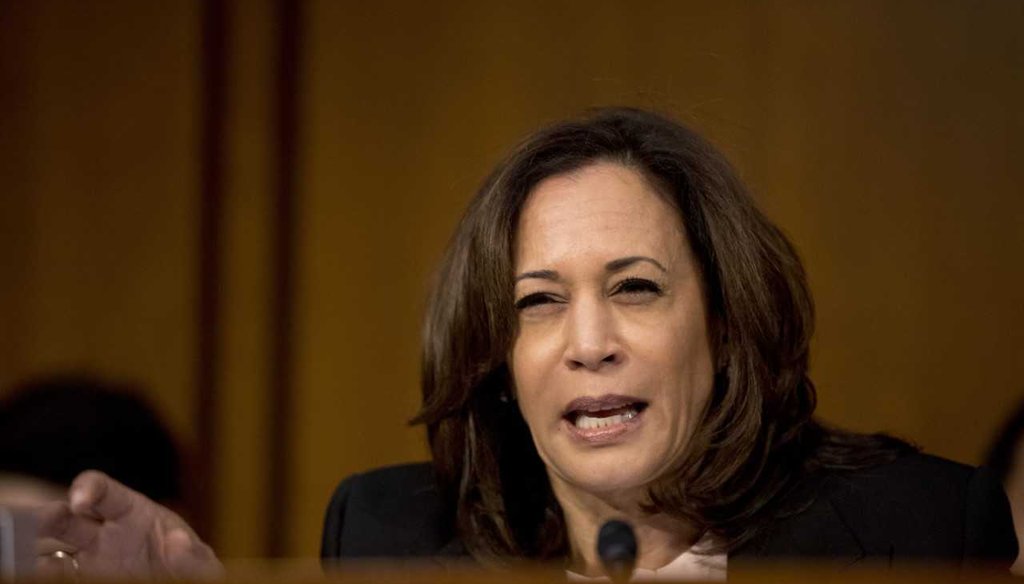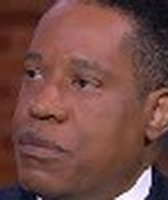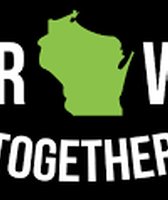Stand up for the facts!
Our only agenda is to publish the truth so you can be an informed participant in democracy.
We need your help.
I would like to contribute

Sen. Kamala Harris, D-Calif. questions Attorney General nominee William Barr as he testifies before a Senate Judiciary Committee hearing on Capitol Hill in Washington, Tuesday, Jan. 15, 2019. (AP Photo/Andrew Harnik)
California Sen. Kamala Harris on Tuesday challenged President Trump’s choice to be Attorney General, William Barr, on whether building a wall along the U.S.-Mexico border would really stop or reduce drug trafficking.
Trump has said he won’t agree to end the partial government shutdown until a deal is reached to fund a border wall, his signature campaign promise. He has frequently claimed a wall would help stop the flow of drugs, as well as illegal immigrants.
Harris, a Democrat and potential 2020 presidential candidate, has repeatedly criticized Trump’s plan for a wall, calling it "a vanity project" that won’t stop drug smuggling.
"I was a prosecutor for many years, including the attorney general of California. I specialized on transnational criminal organizations. That wall ain’t going to stop them. Let’s actually be honest about that," Harris said last week on The View, part of her recent book tour.
Barr, a Republican, served as U.S. Attorney General under former President George H.W. Bush from 1991 to 1993.
Sign up for PolitiFact texts
Here’s the exchange between Harris and Barr on Capitol Hill Tuesday about the border and drug trafficking. We’ll examine the facts about the flow of drugs through ports of entry at the end.
Harris: "You mentioned that we need barriers across the border to deal with drug trafficking. Are you advocating a wall?"
Barr: "Well, I think I’m advocating a system. A barrier system in some places. I’d have to find out more of the situation since I last visited the border."
Harris: "From what you know, do you believe that a wall would address the concern that you have about drug trafficking?"
Barr: "Well, a wall certainly would. But in some places it may not be necessary to have what most people imagine as a wall."
Harris: "Are you aware that most of the drugs coming into the United States, and particularly through Mexico, are entering through ports of entry?"
Barr: "Yes. But they also come elsewhere and so do illegal immigrants cross the border."
Harris: "But to continue on the subject of drug trafficking, are you aware that most of the drugs that are trafficked into the United States enter through ports of entry?"
Barr: "Yes."
Harris’ claim that most drugs enter the country through legal ports of entry is supported by experts on the topic, as well as by federal government reports.
Take heroin, for example.
"The majority of the flow is through POVs (privately owned vehicles) entering the United States at legal ports of entry, followed by tractor-trailers, where the heroin is co-mingled with legal goods," according to a November 2018 report by the National Drug Enforcement Agency.
PolitiFact examined whether a wall would impede the flow of drugs in an October 2017 article:
"Traffickers have a variety of mechanisms at their disposal on how to overcome the wall," said Vanda Felbab-Brown, a senior fellow at the Brookings Institution, told PolitiFact at the time.
Mexican Transnational Criminal Organizations "remain the greatest criminal drug threat to the United States," and their most common method of smuggling drugs remains vehicles legally coming through U.S. ports of entry, PolitiFact reported, citing a 2016 Drug Enforcement Administration report. Illegal drugs are smuggled in concealed compartments in passenger vehicles or blended with legitimate goods in tractor trailers, the report said.
Smugglers also attempt to get drugs into the United States using catapults, drones, boats and tunnels. At least 225 tunnels were discovered on U.S. borders from 1990 to March 2016, according to the DEA.
Earlier this month, the Associated Press called out Trump’s inaccurate claim that drugs "don’t go through the ports of entry."
"The drugs are pouring into this country. They don’t go through the ports of entry. When they do, they sometimes get caught," Trump said at a White House news conference on Jan. 4.
Here’s how the AP assessed the claim:
"He’s wrong in saying drug smugglers don’t or only rarely use official border crossings for their trafficking. Land ports of entry are their primary means for getting drugs into the country, not stretches of the border without barriers, says the U.S. Drug Enforcement Administration."
Those fact checks and government reports add legitimacy to Harris' questions and support her conclusion.
Our Sources
Sen. Kamala Harris, Attorney General nominee William Barr, Senate Judiciary Committee hearing, Jan. 15, 2018
AP FACT CHECK: Trump's false claim about drug smuggling, Jan. 4, 2019
PolitiFact, Will a border wall stop drugs from coming into the United States?, Oct. 26, 2017
U.S. Drug Enforcement Agency, 2018 National Drug Threat Assessment, October 2018
















































